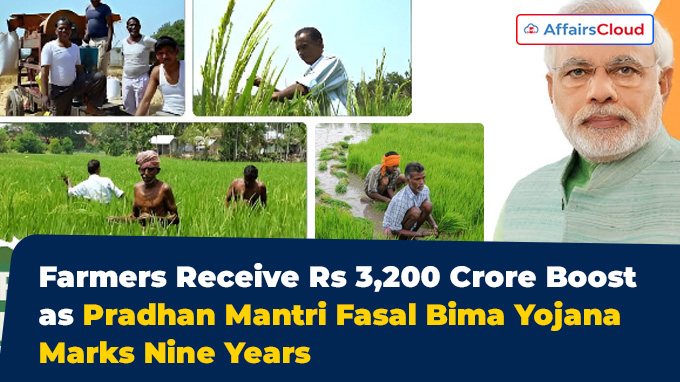 In August 2025, Union Minister Shivraj Singh Chouhan, Ministry of Agriculture and Farmers Welfare (MoAFW) announced the digital transfer of insurance payout worth Rs.3,200 crores directly through Digital Benefit Transfer (DBT) to the bank accounts of approximately 35 lakh farmers at an event held in Jhunjhunu, Rajasthan, marking 9 years of the Pradhan Mantri Fasal Bima Yojana (PMFBY).
In August 2025, Union Minister Shivraj Singh Chouhan, Ministry of Agriculture and Farmers Welfare (MoAFW) announced the digital transfer of insurance payout worth Rs.3,200 crores directly through Digital Benefit Transfer (DBT) to the bank accounts of approximately 35 lakh farmers at an event held in Jhunjhunu, Rajasthan, marking 9 years of the Pradhan Mantri Fasal Bima Yojana (PMFBY).
- It is the first installment, transferred under the PMFBY, with approximately Rs.8,000 crores to be released in next installments.
Exam Hints:
- What? Rs.3,200 Crores transferred directly into the bank account of 35 lakh farmers
- Scheme: Pradhan Mantri Fasal Bima Yojana (PMFBY)
- Announced by: Union Minister Shivraj Singh Chouhan, MoAFW
- Scheme launch: 2016
- Purpose: To protect the farmers from financial loss due to crop failure by natural calamities, pests, and diseases.
Event Highlights:
Key Dignitaries: Several dignitaries, including Minister of State (MoS) Bhagirath Choudhary, MoAFW; Chief Minister (CM) of Rajasthan Bhajanlal Sharma, were also present.
States: Under the state-wise claim distribution, Farmers in Madhya Pradesh (MP) received Rs. 1,156 crores, farmers in Rajasthan received Rs.1,121 crores, Chhattisgarh received Rs.150 crores and farmers in other states ,and farmers in other states received Rs.773 crore.
Penalty: From Kharif 2025, any delay by states or insurers will incur a 12% penalty.
About Pradhan Mantri Fasal Bima Yojana (PMFBY):
Aim: PMFBY, a flagship initiative by the Government of India(GoI), was launched on February 18, 2016, with an aim to protect the farmers from financial loss due to crop failure by natural calamities such as droughts, floods cyclones, pests, and diseases.
- In January 2025, the Union Cabinet approved the continuation of PMFBY and Weather Based Crop Insurance Scheme (RWBCIS) till 2025-26, with a total budget of Rs.69, 515.71 Crores.
- RWBCIS is a weather index-based scheme, introduced along with PMFBY, which differs in its methodology of calculation of admissible claims to the farmers.
Cycle: PMFBY covers the entire crop cycle, from pre-sowing to post-harvest, including damage during storage if caused by a notified calamity.
Benefits:
Premium: The farmers pay 2% of sum insured for Kharif crops, 1.5% of sum insured for Rabi crops, and 5% of sum insured for the horticulture/commercial crops.
Coverage: The coverage includes yield losses, prevented sowing (up to 25% of sum insured), post-harvest losses (up to 14 days post-harvest), and localized calamities.
- The GoI pays the entire premium for the farmers in the North-Eastern States, Jammu & Kashmir (J&K), and Himachal Pradesh (HP).
Compensation: PMFBY aims to process claims within two months of the harvest to ensure that farmers receive the compensation quickly.
Technology: The scheme integrates advanced technologies such as satellite imaging, drones, and mobile applications(apps) for precise estimation of crop loss, ensuring accurate claim settlements.
Eligibility:
Non-Loanee Farmers: The farmers, opted for non-standard Kisan Credit Card (KCC) scheme-linked crop loans, farmers who have not taken crop loans are eligible. All non-loanee farmers can voluntarily enroll under the PMFBY to mitigate risk and claim insurance benefits.
Loanee Farmers: The farmers, who have been sanctioned loans from financial institutions for Seasonal Agricultural Operations (SAO). All loanee farmers are required to enroll under PMFBY.
Implementation:
The scheme is implemented through the departments of the state governments, empanelled insurance companies, Banks and Primary Agricultural Credit Societies (PACS), and Regulatory bodies.
Achievements :
Enrollment: Farmer enrolment rose 32% from 3.17 crore (2022-23) to 4.19 crore (2024-25).
Applications: As of June 30, 2025, a total of 78.407 crore farmer applications have been insured under PMFBY since its inception in 2016. Out of these applications, 22.667 crore farmers received claims worth Rs.1.83 lakh crore.
Expansion: Coverage grew from 371 lakh (2014-15) to 1,510 lakh (2024-25), and non-loanee applications from 20 lakh to 522 lakh.
Technology:
Remote Sensing: The schemes utilizes remote sensing and drones for estimating the crop area, yield assessment, and loss evaluation, to reduce human error.
YES-TECH: Yield Estimation System Based on Technology (YES-TECH) was introduced for paddy and wheat crops from Kharif 2023 season, which blends satellite-based yield estimated with manual data, gradually phasing out traditional Crop Cutting Experiments (CCEs). From 2024 Kharif season, soyabean has also been included.
WINDS: Weather Information Network and Data System (WINDS) was developed to establish an expanded network of Automatic Weather Stations (AWS) and Automatic Rain Gauges (ARG). It will collect hyper-local weather data at Gram Panchayat and Block levels. The collected data will be integrated into a national database with interoperability.
PMFBY Strengthening Measures:
National Crop Insurance Portal (NCIP): Facilitates online farmer enrolment, data sharing, scheme monitoring, and direct transfer of claim amounts to farmers’ bank accounts.
Dedicated DigiClaim Module:Operational since Kharif 2022, it links NCIP with the Public Finance Management System (PFMS) and insurance company systems. From Kharif 2024, a 12% penalty is automatically applied for delayed claim payments.
Mandatory ESCROW Account for States: From Kharif 2025, States must open an ESCROW account and deposit their premium share in advance.
Awareness Campaigns for Farmers:Since Kharif 2021, ‘Crop Insurance Week/Fasal Bima Saptah’ is held twice a year, along with ‘Fasal Bima Pathshalas’ in villages to educate farmers.
Meri Policy Mere Haath’ Initiative:Crop insurance policy receipts are distributed to PMFBY-enrolled farmers via special camps held at the gram panchayat and village levels.
KRPH (KrishiRakshak Portal and Helpline): Launched to assist farmers with PMFBY queries and complaints, the KRPH platform and toll-free number 14447 provide ticket numbers for tracking issues, ensuring timely resolution and enabling government monitoring of grievance redressal.
About Rajasthan:
Chief Minister (CM) – Bhajan Lal Sharma
Governor – Haribhau Kisanrao Bagade
Capital – Jaipur
National Park (NPs) – Ranthambore NP, Mukundra Hills NP




